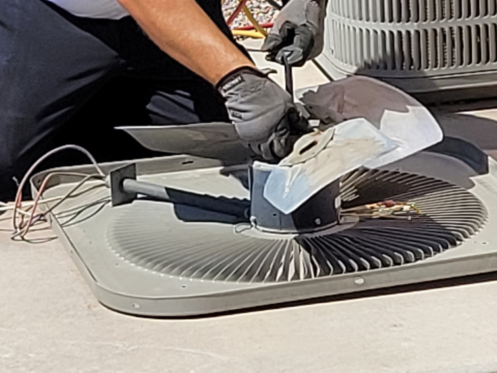Homeowners are always looking for ways to save money with their HVAC system. One of those ways is to improve their system’s efficiency and lifespan. From replacing a bad thermostat with a programmable thermostat to routinely changing out the air filter. However most homeowners forget an important part of the HVAC system, the outdoor condenser unit. Debris like dust or oil can pile up over time and impede the heat transfer process, making your system less efficient. According to the U.S. Department of Energy’s (DOE), “A dirty condenser coil can increase compressor energy consumption by 30 percent.” Cleaning HVAC coils is important as any obstruction of foreign materials in the HVAC heat transfer process creates a:
- Decrease in AC efficiency
- Increase in energy usage and operating expenses
- Significantly increases the possibility of early HVAC failures
Dirt, dust, leaves, pollen, and mower discharge can all hinder the flow of air through the HVAC coil. On the other hand, the cleaner the coil’s surface area is, the less energy your system has to use.
What is the Difference in Condenser coils and Evaporator Coils?
The condenser unit, which is typically a large metal outdoor system, houses the HVAC coils. The coils are metal tubes that run through metal fins designed to remove heated air from the house. Heat is removed using refrigerant which travels through the coils. As heated refrigerant travels through the tubes, heat dissipates and the refrigerant cools down before moving back into the house.
Evaporator coils, which are similar to condenser coils, are located within the house. After the refrigerant travels through the condenser coils, it moves back inside to the evaporator coils. During the process of traveling through the evaporator, the refrigerant will absorb heat and moisture to cool the indoor air.
How Often Should You Clean HVAC Coils?
An annual spring cleaning is typically done towards the end of spring. This will ensure your unit will be at peak performance before the temperatures rise. However, if your unit has surroundings that create debris like nearby foliage or a dusty yard then you’ll need to clean more frequently.
Why It’s Important to Clean HVAC Coils
The biggest reason to keep your HVAC coils clean is the benefits it brings. Dirty coils, fans, and compressors have to work harder and longer to transport the same amount of cool air. Compared to clean coils that are able to work as intended, there is a significant decrease in efficiency with dirty coils. With the loss of efficiency, your system will run more frequently and for longer periods of time. Which in turn, creates higher energy bills. In addition, the stress of dirty components adds more wear to your system which increases the amount of repairs needed. Another benefit of cleaning HVAC coils is the opportunity to inspect the insides of your condenser unit. This is when you can catch problems such as loose or burnt wires, cracked or broken pipes, or even advanced corrosion. As these problems might have gone unnoticed until serious damage occurred.
How to Minimize the Amount of Accumulated Dirt/Debris
From fallen leaves of nearby foliage to grass blown around from the lawn mower, there are numerous potential sources of debris that can damage the condenser unit. Even a dust from a dryer vent can find its way into the condenser. In an effort to keep the HVAC coils cleaner, use these methods.
- Keep all foliage located above or around the unit trimmed back at least 2 feet during all seasons
- Be mindful of the mower discharge direction and avoid directing it at the unit
- Remove accumulated leaves before they make their way inside the condenser cabin
- Use a mesh leaf guard over the top to prevent leaves from lying on top or falling into the unit
- Use a hose with low water pressure to gently wash any dust from the fins and coils
- As dirt can cause blockage with bent or broken coil fins. Inspect the fins for damage and call a technician if necessary
HVAC Health Check
If you decide to take up the task to clean hvac coil yourself, here are some key points to remember!
- Coil cleaner is actually a health hazard. So before cleaning the hvac coils, prepare to use safety glasses, gloves, and chemical-resistant clothing. Read the bottle to see if the solution is best for aluminum or copper fins and coils.
- Extremely charged systems like air condensers have to be cut off from all electricity before cleaning. You will need to disable the connection from the electric breaker linked to the condenser unit. Simply turning off the system at the thermostat will not disconnect the unit.
- When cleaning the unit, let the cleaner do the work. Avoid physically touching the delicate fins and coils as much as possible
Removing debris from the insides of the condenser unit and cleaning the fins and coils can be done by your technician. As part of a technician’s HVAC health check routine, cleaning is a part of the process of inspecting for damage. So if you feel uncomfortable or unsure about doing it yourself, contact us at Satterlee! Talk to one of our technicians today to see how we can help your system run more efficiently.


